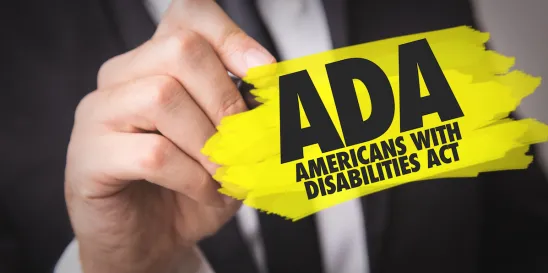At the close of 2023, the Supreme Court dismissed the appeal of petitioner Acheson in Acheson Hotels, LLC v. Laufer as moot and vacated the underlying decision by the First Circuit that Laufer had constitutional standing to bring her ADA claims. The decision came as no surprise following the Justices’ sharp focus on mootness during oral argument in October. Our earlier posts provide coverage of that oral argument and the petition for appeal. At the time of oral argument, it was uncertain whether the Court would rest its decision concerning jurisdiction on mootness or standing. That question has now been resolved.
Laufer’s Unusual Controversy and Procedural History
The Court’s decision rested on the unique procedural posture of the case. Acheson filed its appeal following the First Circuit’s decision that Laufer demonstrated sufficient injury to have Article III standing to pursue her ADA claims against a hotel with alleged accessibility barriers on its website. The First Circuit had reasoned that Laufer, despite her admitted status as a tester, had suffered “dignitary harm” on top of her “informational injury” from these accessibility barriers. Our coverage of the First Circuit’s decision is available here.
After the First Circuit’s decision and the Supreme Court’s agreement to hear Acheson’s appeal, Laufer’s trial counsel was suspended from practicing law for defrauding hotels in fee petitions and settlement negotiations. That same attorney also funneled hundreds of thousands of dollars to Laufer’s family member for work not actually performed, raising serious ethical questions concerning Laufer, her trial attorney, and her counsel of record on appeal. After this scandal came to light, Laufer voluntarily dismissed all her pending ADA cases with prejudice, including the complaint that initiated this appeal.
Following the voluntary dismissal of her claims against Acheson, Laufer urged the Court to dismiss the case for mootness. Acheson opposed dismissal and urged the Court to hear its challenge to Laufer’s constitutional standing. The Supreme Court denied the request to dismiss and agreed to hear oral argument. At oral argument, counsel for Laufer argued the case was moot, while counsel for Acheson argued that the Court should not permit litigants to use voluntary dismissal as a tactic to avoid unfavorable rulings. The Justices themselves expressed concern during questioning that any opinion they might issue would be advisory because the plaintiff had abandoned her claims, the ownership of the hotel had changed, and the website at issue had been modified to comply with governing law.
Supreme Court Dismissal for Mootness and Vacatur
Against this backdrop, Justice Barrett, writing for a unanimous Court with Justices Thomas and Jackson concurring, pointed to Laufer’s voluntary dismissal of all her pending website accessibility suits with prejudice, including her complaint against Acheson. Justice Barrett expressed sensitivity to Acheson’s concern that, if the Court dismissed the case for mootness, litigants may be encouraged to manipulate the jurisdiction of the Court and a deep circuit split concerning constitutional standing would likely persist with very little incentive for defendants to travel the lengthy road to the Supreme Court that Acheson chose to venture.
Nonetheless, based on Laufer’s voluntary dismissal of her pending ADA cases and representation to the Court that she will not file any other such cases, the Court concluded that Laufer’s case against Acheson was moot and vacated the judgment of the First Circuit with instructions on remand to likewise dismiss the case as moot. Justice Jackson diverged on this single point, noting that she would have left the First Circuit’s judgment in place. Justice Thomas, on the other hand, agreed that the appeal should have been dismissed for lack of jurisdiction, but for lack of standing rather than mootness.
Circuit Court Split Persists and First Circuit Decision Becomes a Clean Slate
As Justice Barrett aptly and succinctly noted, “Laufer has singlehandedly generated a circuit split. The Second, Fifth, and Tenth Circuits have held that she lacks standing; the First, Fourth, and Eleventh Circuits have held that she has it.” Justice Jackson also explained that the Court’s decision to vacate the underlying decision along with its dismissal of the appeal for mootness, consistent with the Court’s practice of Munsingware vacatur, has the effect of erasing the First Circuit’s opinion and making the issue one that is once again open in the First Circuit. Although Justice Jackson would have left the First Circuit’s decision intact, the Court has nonetheless cleaned the slate. However, with no indication that the First Circuit would rule differently in a future case, the Court has left litigants with a persistent circuit split.
Under circuit court precedent, testers continue to generally lack standing to sue for alleged violations of the ADA on hotel websites in the Second, Fifth and Tenth Circuits, while testers in the Fourth and Eleventh Circuits (and likely also the First) will have standing to sue. With the Supreme Court unlikely to reach this question again in the near future—despite Justice Barrett’s promise that the Court “might exercise our discretion differently in a future case” to resolve the split even in a mooted dispute—the only thing that this decision has guaranteed is that website accessibility suits, including those brought by testers, will not go away with 2023 and will likely persist into 2024 and for years to come. Against this backdrop, companies headed into the new year are wise to invest in measures to mitigate against the risk of website accessibility litigation, as discussed in our prior guidance.



 />i
/>i
